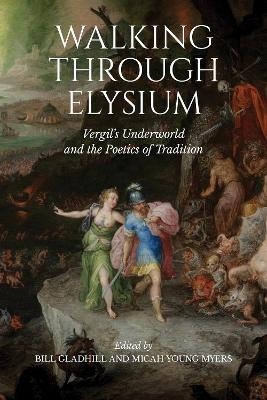
Walking through Elysium
University of Toronto Press (Verlag)
978-1-4875-0577-6 (ISBN)
Walking through Elysium stresses the subtle and intricate ways writers across time and space wove Vergil’s underworld in Aeneid 6 into their works. These allusions operate on many levels, from the literary and political to the religious and spiritual. Aeneid 6 reshaped prior philosophical, religious, and poetic traditions of underworld descents, while offering a universalizing account of the spiritual that could accommodate prior as well as emerging religious and philosophical systems. Vergil’s underworld became an archetype, a model flexible enough to be employed across genres, and periods, and among differing cultural and religious contexts.
The essays in this volume speak to Vergil’s incorporation of and influence on literary representations of underworlds, souls, afterlives, prophecies, journeys, and spaces, from sacred and profane to wild and civilized, tracing the impact of Vergil’s underworld on authors such as Ovid, Seneca, Statius, Augustine, and Shelley, from Pagan and Christian traditions through Romantic and Spiritualist readings. Walking through Elysium asserts the deep and lasting influence of Vergil’s underworld from the moment of its publication to the present day.
Bill Gladhill is an associate professor in the Department of Classics at McGill University. Micah Y. Myers is an associate professor of classics at Kenyon College.
Introduction: Bill Gladhill, McGill University, and Micah Myers, Kenyon College
1. Into the Woods
Alessandro Barchiesi, New York University
2. Statius’ Walking in Vergil’s Footsteps
Emily Pillinger, King’s College London
3. The Sibyl’s Cave and Visions of the Future
Maggie Kilgour, McGill University
4. Exploring the Forests of Antiquity: The Golden Bough in Early Modern Literature
Matteo Soranzo, McGill University
5. Aeneas’ Steps
Miguel Herrero de Jáuregui, Universidad Complutense de Madrid
6. Vergil’s Underworld and the Afterlife of Love Poets
Micah Y. Myers, Kenyon College
7. Vergilian Underworlds in Ovid
Alison Keith, University of Toronto
8. Mortem aliquid ultra est: Vergil’s Underworld in Senecan Tragedy
Bill Gladhill, McGill University
9. Servius on Sinners and Punishments in Vergil’s Underworld
Fabio Stok, University of Rome Tor Vergata
10. Paradise and Performance in Vergil’s Underworld and Horace’s Carmen Saeculare
Lauren Curtis, Bard College
11. Why isn’t Homer in Virgil’s Underworld? – and Other Notable Absences
Emily Gowers, University of Cambridge
12. The Silence of Aeneid 6 in Augustine’s Confessions
Jacob L. Mackey, Occidental College
13. Spiritualism as Textual Practice
Grant Parker, Stanford University
| Erscheinungsdatum | 05.07.2021 |
|---|---|
| Reihe/Serie | Phoenix Supplementary Volumes |
| Verlagsort | Toronto |
| Sprache | englisch |
| Maße | 159 x 235 mm |
| Gewicht | 640 g |
| Themenwelt | Literatur ► Klassiker / Moderne Klassiker |
| Geisteswissenschaften ► Philosophie ► Philosophie Altertum / Antike | |
| Geisteswissenschaften ► Religion / Theologie | |
| Geisteswissenschaften ► Sprach- / Literaturwissenschaft ► Anglistik / Amerikanistik | |
| Geisteswissenschaften ► Sprach- / Literaturwissenschaft ► Literaturwissenschaft | |
| ISBN-10 | 1-4875-0577-9 / 1487505779 |
| ISBN-13 | 978-1-4875-0577-6 / 9781487505776 |
| Zustand | Neuware |
| Haben Sie eine Frage zum Produkt? |
aus dem Bereich


